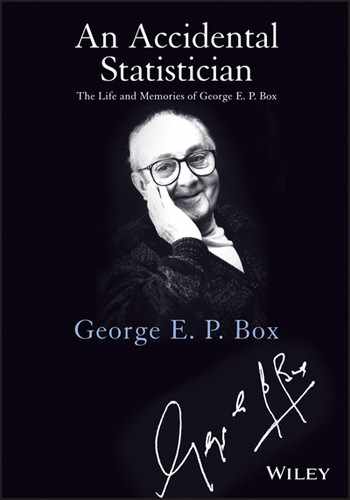Chapter Twenty One
Memories
Here are a few excerpts from letters given to me on my 65th birthday in 1984:
I fondly remember, among others, these “labors of love” over the past years: Proofreading BH2, helping Ron Snee with your “Practice and Theory” videotapes, and helping Bill Hunter, Bovas Abraham and Kevin Little with putting together this volume of letters. I wish you the best of health and everything else for the next 26 years!
Steve Bailey
P.S. Here's one more “Factional fact”: How many persons attended the “Wisconsin dinner” at the ASA Meetings in Philadelphia last month? Why, exactly 64 (or 26 ), of course!
You stimulated us to learn within the classroom, but like all master teachers, you also provoked us to spend much more time outside of lectures probing and arguing with each other and exploring this unfamiliar territory that held such a special fascination for each of us. From you we learned the importance of regarding published material with polite (and sometimes impolite) skepticism and the reality of the continuing iteration between conjecture and evidence. For those of us who would continue to be involved in research, this was an essential lesson. You also served as an incomparable role model for those of us who would become statistical consultants. The “real world” problems you assigned us, your joint discussion with us concerning these problems, and your restrained but incisive criticisms of our proposed solutions have had a lasting influence. Finally, for those of us whose subsequent careers have involved teaching, your expository skills will be recalled most vividly. The careful presentation, the enthusiastic but sensitively paced presentation, the marvelous use of geometric illustration, and the ever present good humor were combined to create a classroom experience which we can only try to emulate.
David W. Bacon
I'm sitting on my boat anchored in Hope Town Harbor in the Bahamas on a beautiful warm sunny day reminiscing about some of the experiences we shared such as:
—seeing you in action for the first time at an Army Experimental Design Conference in Raleigh during the first week of my graduate studies and then meeting for the first time later that night amid a shower of jokes over a “few” drinks with Sig, Stu, Mike, and Maurice at our apartment.
—the absolutely marvelous summers at Old Bald Smith and Gauss Houses at Princeton with STRG (Statistical Research Group). Never was a PhD thesis started with more enjoyment and stimulation. I probably never thanked you for the opportunity provided but now I do!
Don Behnken
I have many memories of a kind man with many other interests. One who likes Shakespeare plays, Bergman movies, Mahler symphonies, as well as those old radio “Goon Shows,” and who does excellent imitations of Peter Sellers. I remember a man sitting at a usually cluttered desk in an office, trying to locate a ringing phone hidden in one of his desk drawers. I remember rollicking Christmas parties at your house where students and professors mixed in an informal atmosphere and could poke fun at each other in skits they had written themselves. The highpoint was usually the song sung by you and Norman Draper. I remember a kind man deeply concerned about social issues. I still have one of your bumper stickers that called for Nixon's impeachment. I remember a distinguished academician who in his colorful Tudor academic regalia walked with me through graduation. It even got us a spot on the local evening news.
Thank you for all these memories.
Johannes Ledolter
I feel very fortunate that I was able to have you as my advisor. My admiration for you has grown more and more as I have come to realize how much you did for me and all your students. We were able to work on some very interesting and important problems and the end results were very good. Your suggestions were sound and sensible, and they always worked. (Surprisingly often anyway.) I remember being skeptical at times and not always willing to take your advice –only to be proven wrong later on. I am now pleased and proud that our joint work was accepted in some very good journals.
Greta Ljung
Finally, I had the good fortune to have you as my thesis advisor. You taught me sensible ways to attack research questions and forced me to strive to understand clearly the problems before me. This past year, when faced with ideas I didn't understand, I've recalled how you would ask me questions to realize where my understanding was shallow. Your own strong intellect and desire to solve important problems pushed me. Thank you for giving me a sound and exciting intellectual apprenticeship.
Kevin Little
To GEORGE BOX, the greatest teacher I have known:
You taught me an entire philosophy of problem solving and along the way I also learned some statistics. For that I will remain forever grateful.
John F. MacGregor
I was always struck by the amount of attention you paid to the presentation for publication of finished research, though on one occasion this gave me some concern. We had shown that a paper, co-authored by Sir Maurice Kendall, analyzing stock market data, was seriously flawed. I remember that our piece commenting on this paper went through several drafts. Your versions were hard-hitting. I, on the other hand, was nervous, since I was returning to England to begin a career, and was reluctant to develop at such an early stage a reputation for bluntness. Therefore, my versions omitted a lot of exclamation marks and attempted to tone down some of the stronger statements. At the end I thought that all was well. However, it turned out that you had a final go at the galley proofs, so that phrases like “insidious capacity to mislead” crept into the final version. By that state I was amused…
Paul Newbold
My first summer in Madison I was assigned to be a Research Assistant to you and Dr. Jenkins who was working with you on the Time Series Analysis book. How patiently you explained to me what Time Series Analysis meant and what you wanted me to do (which I only really comprehended several years later). You gave me a “Mechanical” calculator, you or Dr. Jenkins had brought it from England. It had a hand and if I had to multiply by 6.5, I would move it seven times around and then come back half-a-turn. It was one of my happiest experiences. …not only what I learned but also walking with you and Dr. Jenkins many times to the lake and having lunch together.
Jacobo “Jake” Sredni
One of the most valuable lessons I learned from you is the importance to good statistical research of talking to non-statisticians.
If I could transplant any part of the Wisconsin experience, it would undoubtedly be the Monday night beer and statistics symposium. Those Monday night meetings were a marvelous occasion to see statistics in action…
David Steinberg
In my attempt to depict the interactive characteristics that make you the unique person that you are, George, I find that John Maynard Keynes has written the perfect description:
‘He must reach a high standard in several different directions and must combine talents not often found together… He must understand symbols and speak in words. He must contemplate the particular in terms of the general, and touch the abstract and concrete in the same flight of thought. He must study the present in the light of the past for the purposes of the future. No part of man's nature … must be entirely outside his regard.’
Although Keynes was describing the combination of gifts needed by a master economist, he must have been directing his thoughts toward you, George, the master statistician.
John Wetz
The full text of Bill Hunter's letter that appears in abbreviated form earlier in the book on pp. 164 and 165.
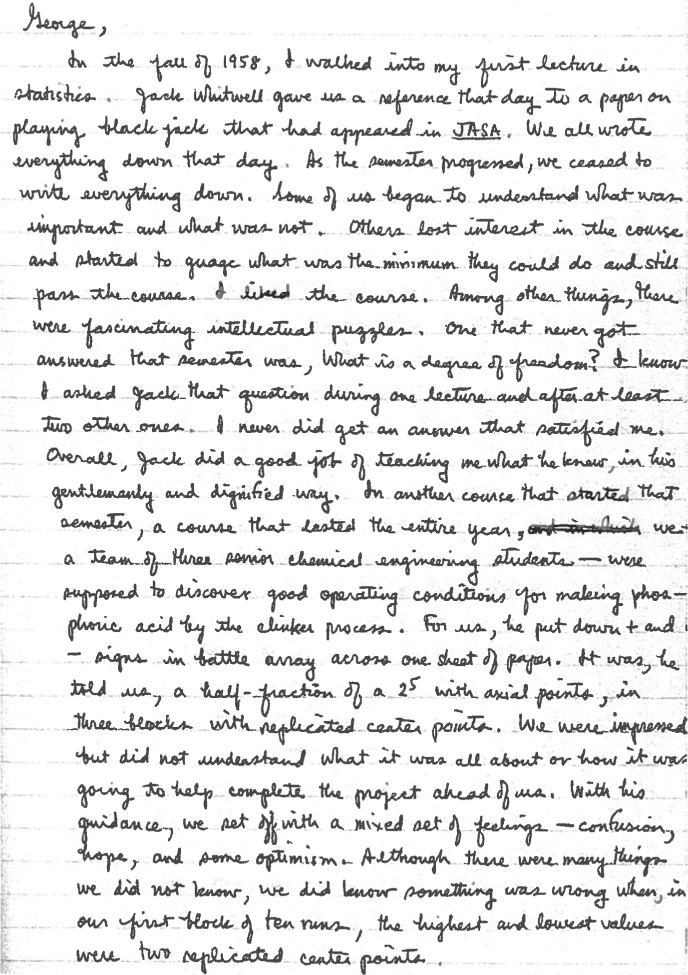
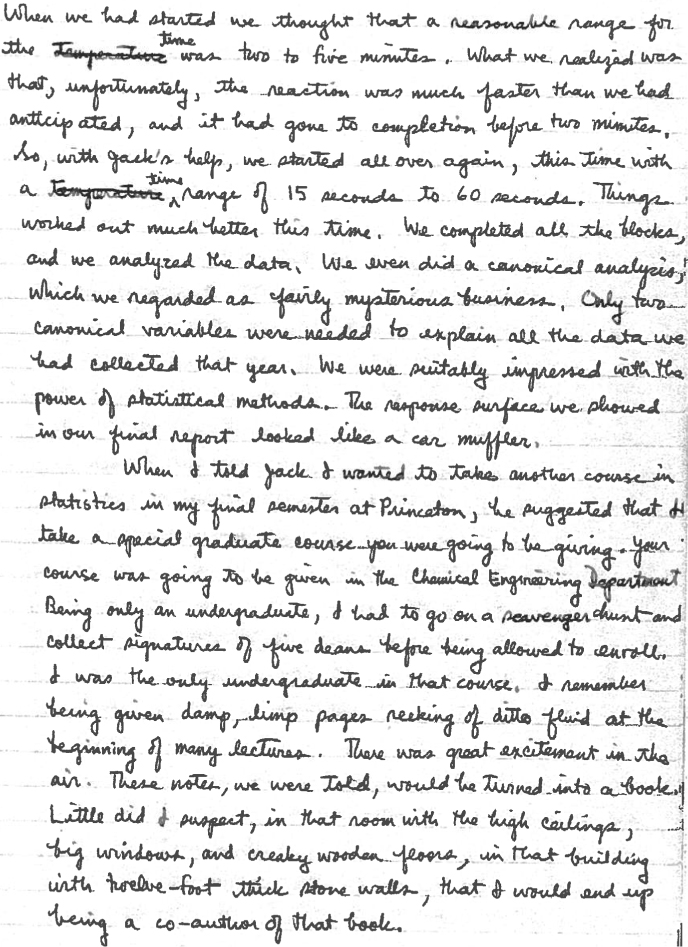


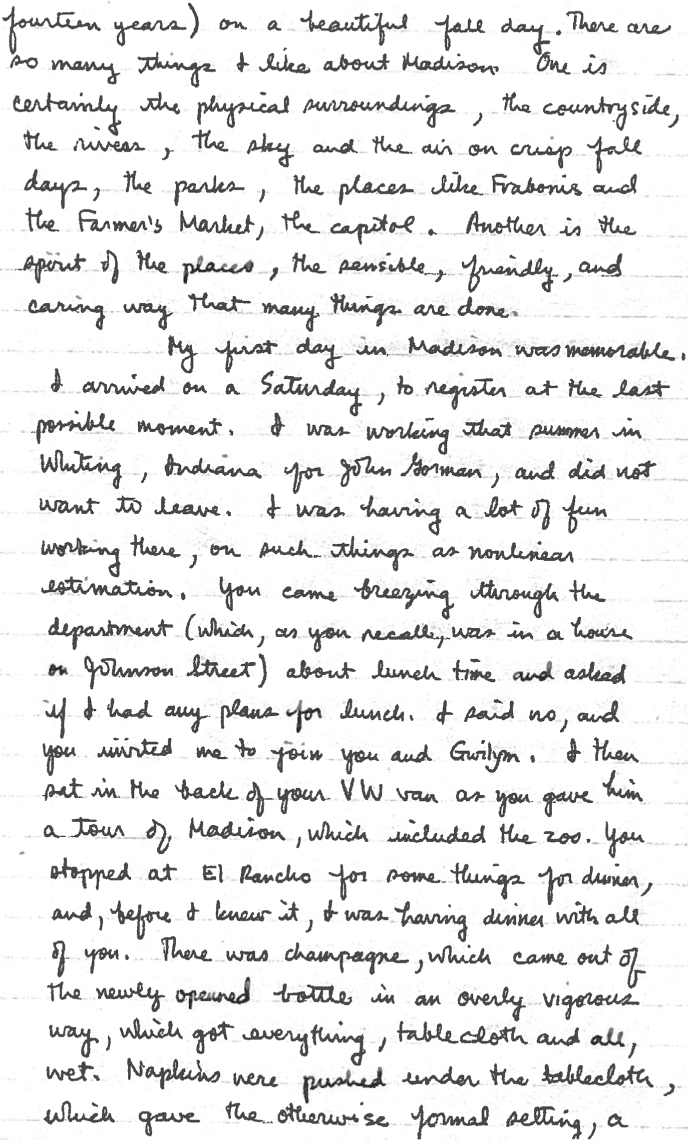
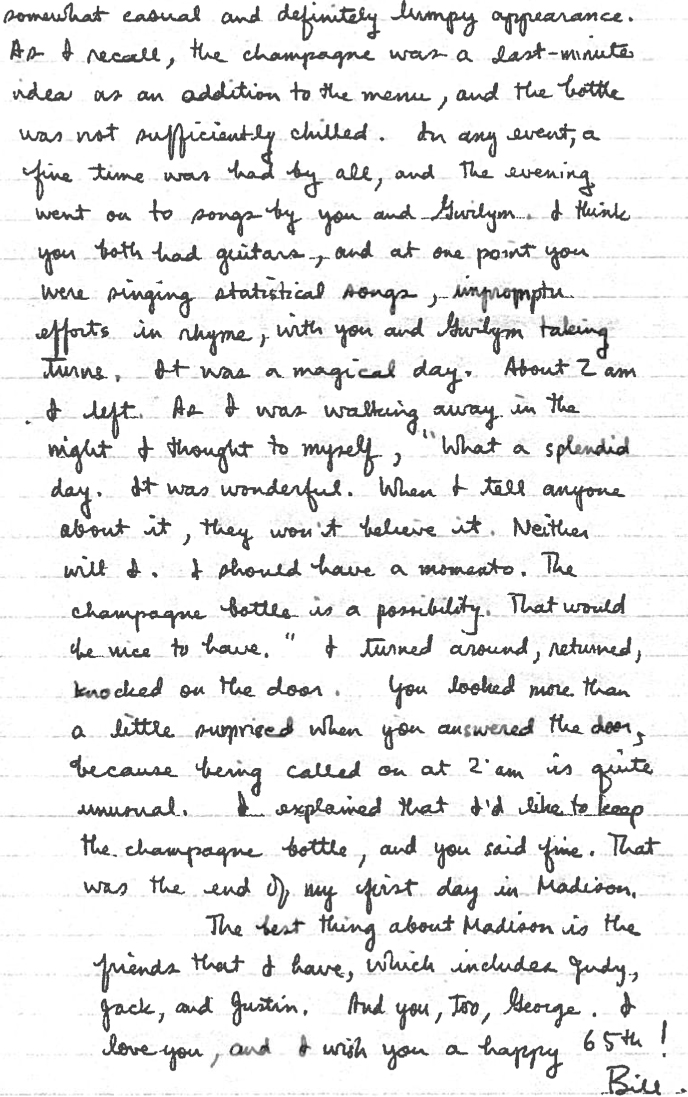
[Citation: William G. Hunter, letter to author, n.d.; presented to me on Oct. 12, 1984.]
Here are a few excerpts from letters given to me upon my retirement in 1991:
My decision to undertake graduate studies at Madison in 1960 was pure good fortune. I knew very little about statistics, but I soon learned, thanks to your unique talent for demonstrating how theory and application can support and nurture each other. Your course lectures were delightful, spiced with historical perspectives, personal experiences, and memorable lines from the British music hall repertoire. For me, however, the most valuable lessons were learned outside the classroom, through your willingness to share insights and those memorable Monday evening beer sessions. Perhaps your greatest talent is compelling people to think for themselves.
You have also been an exceptional role model, as teacher, researcher, mentor, consultant and sensitive human being. It was your influence that prompted me to consider a career as a university professor, a career I have found to be enormously satisfying.
David Bacon
Your influence in statistics in industry is profound. Your footprints can be found in most of the companies with significant statistical applications through your books, your research, your consulting, your students, and the organizations you created. You have moved the world forward in the application of statistics.
Those of us who studied with you benefit in many different ways. But most of all, we had the opportunity to work closely with one of the greatest minds in the world.
No Man, upon retirement, ever took with him as high a degree of respect and good wishes from so many devoted friends, associates, and students.
Gina G. Chen
I never thought when I was hired temporarily for 6 months in 1962 it would stretch out to 29 years and still going. We've come through 5 buildings from an old house to a high-rise building, from electric typewriters to computers. I have many fond memories and consider it a privilege to have worked for you and known you.
Mary Ann Clark
The work that we did together was great fun and, as I hope you know, I've always found your contribution to so many topics (written & spoken) so stimulating, a very special combination of originality and good “sense.”
Sir David Cox
As a master craftsman, you have taught so many apprentices over the years. It is wonderful to see the spreading effects of your teachings throughout the world today.
You have done so much for me personally since we first met in 1955 at I.C.I. Blakely, when I came as a summer student. I am grateful for all of it.
Norman R. Draper
When I was a young student I was surprised and delighted that you would include me in your lunchtime walks–to Picnic Point, around Shorewood, around Vilas Zoo–and that you would share so freely with me so many stories about so many things…
Thank you for deeply touching both my professional and personal lives, and for your inspiration, guidance, humor, and encouragement shared so generously over so many years. I'm a late starter in many ways, and I have a long long way to go. But now I know the value of Point with Pride, and every day it gets better.
Conrad A. Fung
‘It is the duty of the statistician to catalyze the growth of scientific understanding,’ you once said in a class. This is, most of all, what I have learned from you. It has been my beacon and my comfort. It has led me to eschew complexity and to demand from myself the effort to penetrate deeply enough into understanding so that the ultimate simplicity (‘parsimony:’ you would say) that seems to underly most of Nature's doings becomes manifest. It has helped me help others and challenges me to constantly improve.
Bert Gunter
I have learned more from you than I learned from my mother. And my mother was a talker.
Bruce Hoadley
We would like to express, in writing, our strong appreciation for the way we were received and allowed to attend your Monday evening “Beer and Statistics” in your nice house in Madison during our sabbatical year 1987–88. We shall never forget these seminars.
We wish You all the best for Your retirement years, particularly a good health. In that case we feel certain that important contributions to statistics, in particular to the area of Statistical Methods for Quality Improvement, will continue to come from Your hand.
Liv and Arnljot Høyland
I also want to thank you for your encouragement of my development as a statistician. You arranged for me to attend and participate in conferences around the country, introduced me to the statistical community beyond Madison, and worked with me on writing technical papers. You have greatly influenced my approach to statistics and problem solving, instilling in me a philosophy and attitude that is both rigorous and practical.
Stephen Jones
I continue to marvel at my exceptional good fortune in becoming one of your earliest students. And that's only slightly ahead of being able to call you one of my closest friends. I must have been an awfully good guy in my previous incarnation.
J. Stuart Hunter
Listening to you and observing your interaction with other scientists I have always had the sense that I am in the company of a genius. The four years as your graduate student, and particularly my interaction with you, were instrumental in shaping my life. When I came upon a roadblock in my work I had the sense that you always knew the answer or at least had an intuitive sense about how to proceed.
Johannes Ledolter
Here are excerpts from some recent correspondence:
We gave a data set (time series) for analysis as a homework problem in one term. … The model they came up with was not the right one. The right model required a bit more thinking and this became one of the chapters in my thesis. I had the pleasure of reading several papers and projects which came to George for review. He valued my opinions and I appreciated that. One time a question came from a Ford Motor Company engineer about a fractional factorial design and he wanted George to look into it. George asked me to look at it. When I wrote down all the details it became obvious that the standard handbook that they used as reference (published by ASQ or some group) had a typographical error. It was amazing that people were using it without thinking.
Bovas Abraham
Memories from Gordon Research Conferences on Statistics in Chemistry and Chemical Engineering:
George Box and George Barnard ‘engaging in discussion’ with Genichi Taguchi following Dr. Taguchi's presentation at a Gordon Research Conference, with the remaining 120+ participants looking on in awe. George Box and Maurice Kendall singing many selections from British music hall repertoire.
George Box mastering the art of using ensembles of smaller and smaller scraps of transparencies for presentations using an overhead projector.
George Box as skit writer (with assistance from Bill Hunter, Svante Wold, Steve Bailey, Dave Bacon and others).
George Box leading Wisconsin alumni in singing “On Wisconsin” at Thursday night parties (once we agreed upon the words).
David Bacon
One of the striking things about working with George is that you were his friend first, his colleague second, and finally his student. We were regularly invited to parties just to have fun. There was always music, stories and laughter. And more than a few somewhat bawdy jokes. It was clear that we were part of a team when we were at work. He, like Bill Hunter, had a wonderful way of communicating a vision of how we might help the world by taking a data-based approach to improving the quality of things and the quality of life. Some of his values just pervaded the working atmosphere and we picked them up–a belief that a careful application of the scientific approach can help us understand and improve life, that we shouldn't take ourselves too seriously and should be able to find laughter every day, and that people matter. We mattered to George and he mattered to us. Thanks, George, for your friendship, guidance and insight. You've made a profound difference in my life and many others.
Tim Kramer
1) George has always been so generous. Once when we were traveling to a conference he gave me one of his many airline club membership cards so we, the students, could enjoy the club lounge at the airport. So I guess I impersonated George Box for a morning.
2) One time, when my band was giving a concert at the Rathskeller, in the middle of a song I felt a tap on my shoulder. There was George with his big smile cheering me on. He came to the concert with you [Claire] and Judy Pagel just because.
3) George's students (Stephen, Tim and José) would take “field trips” to see George at your home on Branson Road in Oregon, WI. One by one we would go into his office and discuss our research topics, while the other students waited in the living room. Just like being at the doctor's office!
4) I also remember getting phone calls from George early in the morning to go see him. Those were days where George had woken up with an idea that couldn't wait. Sometimes he would give you pieces of paper with some ideas he had jotted down at an airport while he was traveling.
5) At some point in my research he had me look at the ASQC logo, a control chart that looked “under control,” and told me that even though the data looked in control, it was not in control in terms of variation. That started the main topic of my dissertation, Cusum charts for variance.
6) And who can forget the parties at your house with music and laughter. I remember one time when George found hats for us to wear. George has always been humorous, a great host, and a great story teller.
José Ramírez
I was re-reading Statistics for Experimenters the other day and decided to write and thank you for making my life as a Process Engineer much less confusing. I was lucky enough to have attended your 5 day course at the Scandic Crown Hotel in Edinburgh around 20 years ago and what I learned that week has been invaluable over the years. Prior to attending your course, I had been thoroughly confused by a 5 day Taguchi methods course. After attending your course, my confusion was swept away and someone who disliked statistics at school became really interested in it. I just wanted to say a big thank you for helping to make me a much better Engineer than I would have been otherwise.
Mark Taylor
Principal Process Engineer
Fourth Dimension Displays Ltd
Fife, Scotland
Finally, here is a New Yorker cartoon from Conrad Fung (by Richard Taylor, The New Yorker, March 8, 1952) who wrote the following:
[I] remembered sitting in George's office in 1979 transcribing by hand a manuscript he was working on. His office had two desks facing away from each other at a 90 degree angle; he sat at his main desk and I sat at the other; and as he would finish a page, he would give it to me; and as I would finish a page, I would return it to him. At one point he said, “Have you been taking out my commas?”

[Citation: © Richard Taylor/ The New Yorker Collection/ www.cartoonbank.com]
